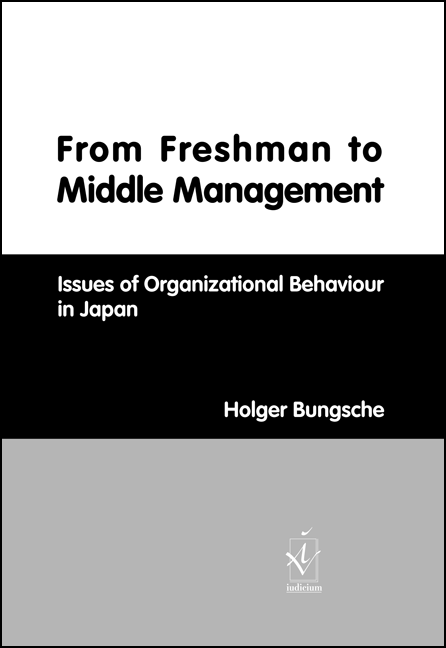|
 Bungsche, Holger Bungsche, Holger
From Freshman to Middle Management. Issues of
Organizational Behaviour in Japan
2004 • ISBN 978-3-89129-414-7 ·
296 S., kt.; EUR 30,40
Many business and management
studies in the past assumed that Japan's 'unique' culture determines the
specific management system, the firms' organization and strategies, and
especially the behaviour of Japanese people in business. However, their
arguments were not very convincing and often didn't exceed the level of
simplifications, clichés, and stereotypes.
Instead of guessing about the influence of culture, this study turns its
attention towards clearly identifiable modern Japanese systems of thought
and how they describe economy, business, society, company, and work.
The study shows that it is the economic demand for effectiveness and
efficiency that determines the education of new company employees and their
further personal development in Japanese firms. The freshmen are expected to
share the perception that the final purpose of working is to contribute to
the company profits and thus to the well being of the society. Moreover, it
is this contribution to the economic growth and prosperity of company and
society that allegedly will also result in personal success and
satisfaction. Since this way of thinking is perceived to be the only
possible one, because it is also the most natural, sharing this thinking and
acquiring the necessary correct attitudes and behaviour are inevitable for
becoming accepted as a member of the company and society. It is this
economic perspective, not only on working, but on life as a whole, that
provides the basis for the company education and the personal development in
Japanese firms.
Holger Bungsche studied Japanese studies, Chinese
studies, modern history and sociology at Friedrich-Alexander-University
Erlangen-Nuremberg, Germany, where he received his MA degree in 1992. After
receiving his M.B.A. in international management form European University
Brussels, he studied at the Department of Business Administration of Kôbe
University, Japan. From 2001 to 2003 he worked at the Social Science
Research Centre of the Friedrich-Alexander-University, where he also
received his Ph.D. in Japanese studies, Chinese studies, and sociology in
2002. For his studies and research he has lived for more than 8 years in
Japan and Taiwan.
|
